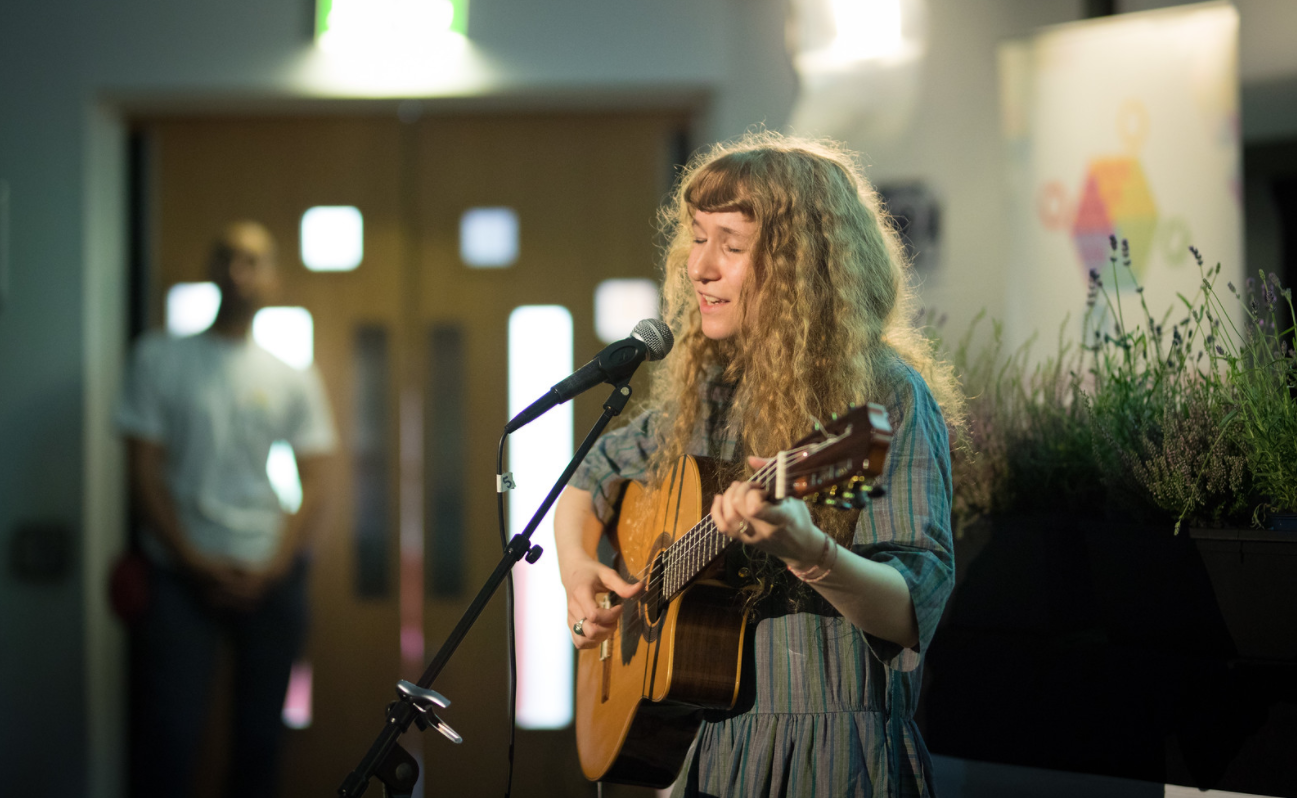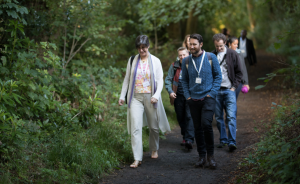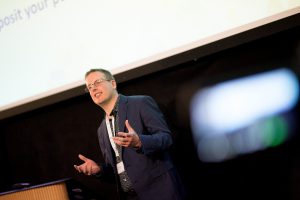
October 18, 2017, by lzzeb
Engaging both the head and the heart: Reflections on Transformations 2017
A blog by Dr Chris Ives
The haunting melody caught us by surprise and held us captive. All eyes were transfixed on the petite singer and her big guitar as she sang, painting sonic images of the Scottish coast and countryside. It was 8:30am on the first morning, and already I knew this was to be a different conference from what I was used to. Transformations 2017 was the third biennial interdisciplinary conference on transformations towards sustainability, this time held in Dundee, Scotland. http://www.transformations2017.org/ I had heard very positive reports from colleagues about the last conference in 2015, and I was eager to participate this year. I had expected Transformations 2017 to be a ‘hybrid’ – a conference that brought together academic research and practice for sustainability. What I didn’t expect was for it to straddle another divide – the divide between head and heart, or as others have put it, our ‘inner’ and ‘outer’ worlds. This performance on the first morning by Lizabett Russo set the tone for the coming days by positioning art, beauty and emotion as legitimate, and perhaps even essential, elements of, and vehicles towards sustainability.
If I was to summarise the key contribution of the conference, it would be the imperative to think more broadly and deeply about sustainability. Perhaps this is fitting as I now find myself in a geography school! Just as scale is a central concept in geography, there is a need to expand the notion of scale in sustainability science. To think more broadly is to recognise that a truly sustainable society will look vastly different from how it does today. The challenge before us is not to develop more efficient solutions within the status quo, but to develop strategies for moving to an altogether different society. To think more deeply is to begin to challenge mindsets and paradigms that influence us collectively and individually.
The structure of the conference helped to facilitate this deepening and broadening of our thinking. In addition to the traditional keynote lectures, there were speed talk sessions and interactive workshops. The speed talk sessions consisted of four 5 minute presentations, followed by space for follow up conversations on the topics introduced. I presented my work on ‘reconnecting people with nature for sustainability’ within the “Place, nature and wellbeing” session. While it was certainly a challenge compressing content into 5 minutes, I found this format – particularly designating time for conversation – to be very stimulating and constructive. The interactive workshops allowed research groups to expose new concepts and ideas in a dynamic and participatory setting. One of my favourite sessions was hosted by researchers from Leuphana University Lueneburg who demonstrated how using creative methods such as playfully ‘building’ scenes using craft materials can be an effective (and fun) tool for engaging diverse stakeholders in transdisciplinary research.

Chris Ives and Kate Irvine walking to the conference dinner at Falkland Estate. All images provided by Dundee and Angus Convention Bureau/Kenneth Malcolm Photography
As I’ve touched on already, one of the most innovative structures of the conference was the inclusion of non-scientific segments. Art was interspersed throughout the programme. In addition to folk singing we were treated to bagpipe music and poetry in the mornings. There was also a resident cartoonist and sculptor who incorporated themes covered in the conference, allowing for conference delegates to participate in different ways and reflect on the content they had heard. Further, one morning Kate Irvine led us in a time of mindful reflective silence before the keynote lecture. I think these approaches – while perhaps a little uncomfortable for some people – help to engage the heart in ways that science alone cannot.
But what of the scholarly content of the conference? There was a lot packed into three days with contributions by academics, activists (e.g. Kumi Naidoo, ex-Executive Director of Greenpeace) and practitioners (e.g. Terry A’Hearn, CEO Scottish Environment Protection Agency), and I can’t possibly summarise the whole lot here. Instead, I just want to mention a few of the ideas that I found particularly stimulating and helpful. First is the presentation by Karen O’Brien (University of Oslo) at the “Facing the Future” side event. Karen spoke about the need to rethink collaboration in the context of sustainability transformations. She emphasised that we don’t “believe what we see”, but rather we “see what we believe”. In other words, our beliefs (about the world, ourselves, others) predetermine the kinds of solutions we pursue and think are possible. Karen suggested that preconditions for social transformations are creativity, empowerment, collaboration and flexibility, as they address our beliefs and can facilitate broader change.
A second session I found particularly stimulating was the keynote by Ioan Fazey (University of Dundee) on “accelerating learning for transformation”. Ioan argued that to pursue sustainability, we do not only need more knowledge, but rather new kinds of knowledge generated via a transformed knowledge system. He referred to Aristotle’s typology of knowledge: (i) Episteme (principles, written word, conventional scholarship), (ii) Techne (know-how), and (iii) Phronesis (wisdom). He argued that sustainability transformations require much more Techne and Phronesis. Not just scientific insights, but knowledge of how and when to apply these insights. Accordingly, he suggested that knowledge systems (and especially universities) need to pursue research on practice, research for practice, and research through practice. This is certainly a challenge for myself as a researcher to work alongside sustainability practitioners to ensure the knowledge I generate is effective and impactful.
Personally, I came away from the conference not only stimulated intellectually, but motivated inwardly to work for a sustainable future for humanity and for our planet. I believe that engaging the heart should not be off-limits in academia. Perhaps it is essential to pursuing the kind of social transformations that our world needs. I suggest that providing more of these ‘heart encounters’ in our research and teaching may yield more a more insightful and effective scholarship. Transformations 2017 was a conference that put academic scholarship in its place: in the context of our humanity and for the purpose of a better future.

Prof. Ioan Fazey, Director of the Centre for Environmental Change and Human Resilience, University of Dundee, during his keynote address. All images provided by Dundee and Angus Convention Bureau/Kenneth Malcolm Photography
No comments yet, fill out a comment to be the first

Leave a Reply